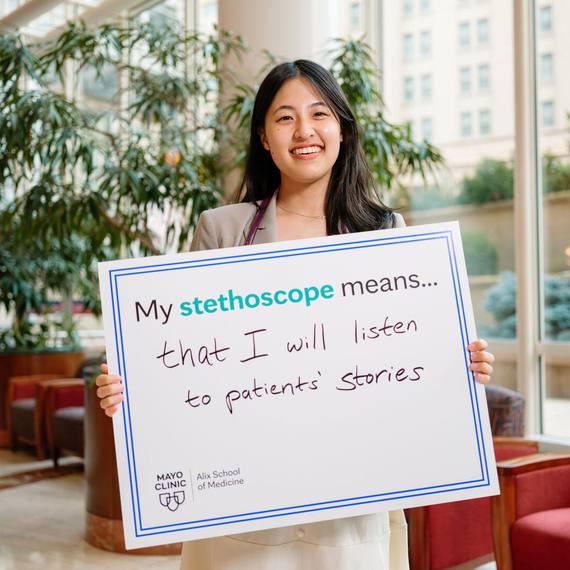-
Third Cohort of Mayo Clinic and Arizona State University MedTech Accelerator Commences

Next-generation medical technology and service startups take part in a boot camp designed to increase product quality, efficiency and speed to market
TEMPE, Ariz. — More than two years into a global pandemic, the clear need for innovative medical breakthroughs has never been more obvious. The Mayo Clinic and Arizona State University (ASU) MedTech Accelerator, a flagship program of the Mayo Clinic and ASU Alliance for Health Care, was designed to help empower medical startups to better navigate challenges while bringing forth life-changing health innovations. The third cohort of this program launched on March 28.
“We are very excited about the technologies being represented in the 2022 cohort of companies,” says Rick Hall, Ph.D., assistant dean from the Edson College of Nursing and Health Innovation and co-managing partner of the MedTech Accelerator. “This year, we have two international companies participating. This allows us to not only leverage the resources of the Mayo Clinic and Arizona State University for all participants, but also to highlight the growing support offered by our regional economic partners to the greater global community.”
The Accelerator provides emerging companies with a multiday immersive curriculum in health care entrepreneurship, which includes lectures and workshops with world-class scientific and engineering experts; resources to navigate regulatory pathways; and tools for product commercialization and customer acquisition. Additionally, participants attend mentoring, business development and networking events.
Companies from last year’s cohort have already reaped the benefits of their Accelerator participation. “As a startup, time and money is your issue. It’s always longer than you think and it costs twice as much. The Accelerator, from an ROI standpoint, is probably 10 times on time and money because within 30 days, we had a year’s worth of clinical direction and clinical input. That’s priceless,” says Mitch Foster, founder of Mindset Medical and a 2021 cohort participant.
This year’s eight participating companies span a wide range of sectors across health care and medicine:
Apex Biologix, Utah: Apex Biologix is the complete resource for physicians using regenerative medicine to treat patients. Apex is dedicated to the science and research of innovative biologic medicine and its potential, and aims to supply physicians with the best products and education available to treat their patients and improve the quality of their lives.
GinaLife, Israel: GinaLife is leading a paradigm shift in early detection, specializing in women's diseases, such as ovarian and cancer, by developing a new approach: vaginal secretions analysis. The process is a simple do-it-yourself and handy home test implementing AI-based proprietary biomarkers. GinaLife's vision is making early detection easy and affordable anytime anywhere.
Medecipher Solutions, Colorado: Medecipher is developing a robust, nurse-centric, decision support platform that will bring much-needed automation to antiquated work processes and address the No. 1 issue facing health care leaders today: nurse staffing. Its solution addresses the challenges of nursing shortages by introducing sophisticated operations research methods that intelligently sequence shifts to align personnel with patient demand while prioritizing preferences, avoiding unpredictable schedules, reducing burnout and increasing satisfaction.
Sense Neuro Diagnostics, Ohio: Sense Neuro Diagnostics is developing noninvasive scanners to detect and monitor the condition of the brain in real time using low-power radio waves. Its first applications are in stroke and traumatic brain injury, where knowing whether a patient’s brain is bleeding or if a patient has had a major stroke is crucial to making effective triage decisions and providing timely treatment. Getting those decisions right can mean the difference between a patient making a good recovery or suffering permanent disability or even dying.
Serva Energy, Arizona: Serva Energy is a clean energy technology start-up based in Tempe, Arizona, with the mission to transform the world through a new age of nuclear. Through the development of a new generation of Smart Nuclear Materials (SMNs) they revolutionize the way nuclear fuels are produced to enhance safety, reactivity control, and environmental sustainability by addressing the problem of nuclear waste. The proprietary technology they have developed in pursuit of the SNMs has additional commercial applications. Specifically in the medical field, they have the potential to expand the applications of nuclear medicine through the identification and manufacturing of novel radio isotopes for use in diagnostic imaging and cancer therapy. Using Serva’s proprietary Isotope Searcher, Serva can identify all of the potential pathways to create any isotope, including those not currently utilized in nuclear medicine as well as those already in use.
SinuSonic, South Carolina: SinuSonic is a revolutionary drug-free, no-mess, two-minute solution to nasal congestion that harnesses the body’s natural processes to provide relief from congestion. It is compact, easy to use, multi-patented, backed by science and championed by internationally renowned physicians. Most importantly, it's nonaddictive and it works.
Spatial, Arizona/California: Spatial unlocks the full potential of immersive technology to enhance human experience in real world environments. From retail stores to offices to hospitals, Spatial’s audio design and deployment platform offers new creative possibilities to enhance environments for meaningful engagement, powerful entertainment, and optimum well-being. Spatial's team and demo locations are located in Emeryville, California, and Scottsdale, Arizona. Led by experienced leaders from Apple, Nest, LucasArts and Disney, and backed by DBL Partners, BITKRAFT Ventures, National Geographic Society, The Kraft Group, Marquee Sports Holdings, WS Development and others, Spatial is poised to reimagine immersive human experiences.
Xsensio, Switzerland: Xsensio develops the unique Lab-on-Skin™ sensing platform to sense in real time biochemical information at the surface of the skin, providing unprecedented real-time information about our health and wellness in a simple and noninvasive way.
“When thinking of MedTech, some may see the evolution of health care into products and services which may have less of a ‘human touch,” says Steven Lester, M.D., associate medical director of Mayo Clinic’s Department of Business Development and co-founder and chief medical officer of the MedTech Accelerator. “What is inspiring about this unique program, however, is the fact that the companies we work with are largely driven toward the creation of holistic-consumer and value-centric products and services. These values, in turn, reflect the core principles driving our Alliance for Health Care.”
Learn more about the Mayo and ASU MedTech Accelerator.
###
About MedTech Accelerator
The MedTech Accelerator is supported by The Mayo Clinic and Arizona State University Alliance for Health Care. The alliance is developing comprehensive improvements in the science of health care delivery and practice, all toward one goal: continually advancing patient care. Together, the recognized world leader in patient care, education and research, and the nation's No. 1-ranked university for innovation are combining expertise from every corner of health care — doctors to bioengineers to business experts — for an adaptive approach to preparing the next generation of health care pioneers and practitioners in our communities.
About Mayo Clinic
Mayo Clinic is a nonprofit organization committed to innovation in clinical practice, education and research, and providing compassion, expertise and answers to everyone who needs healing. Visit the Mayo Clinic News Network for additional Mayo Clinic news.
About Arizona State University
Arizona State University has developed a new model for the American Research University, creating an institution that is committed to access, excellence and impact. ASU measures itself by those it includes, not by those it excludes. As the prototype for a New American University, ASU pursues research that contributes to the public good, and ASU assumes major responsibility for the economic, social and cultural vitality of the communities that surround it.
Media contacts:
- Annie DeGraw, Arizona State University, 602-502-3856, annie.degraw@asu.edu
- Jim McVeigh, Mayo Clinic Public Affairs, 480-301-4222, mcveigh.jim@mayo.edu







